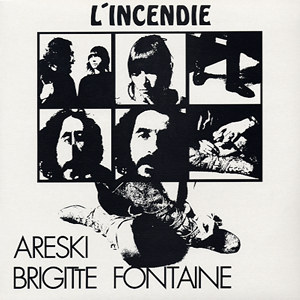Howdy stranger: F is for Fontaine, Brigitte

(Introduction provided here.)
Brigitte Fontaine and Areski's L' Incendie resides on the shelf in between Flying Saucer Attack's Mirror and The For Carnation's Fight Songs.
This about tops the list of CDs that I don’t listen to very often. I don’t remember exactly when or where I purchased this album (although I suspect Other Music around 1996), and I’m fairly certain that this is the first time that I've given it a spin in well over a year. Before I get into whether it was worth that spin, allow me to provide you with a bit of background info on this strange French chanteuse.
Brigitte Fontaine was a peer of Francoise Hardy during the early-1970s French music scene and the heralded diva of France's underground music scene. While Hardy was more of a rose-colored glasses sort-of pop singer, Fontaine was a kaleidoscope, full of fractured colors and intriguing geometry. Fontaine collaborated with a variety of arrangers and songwriters during the ‘70s, most notably Serge Gainsbourg. But, her consistent sidekick—both in her personal and musical life—was a man named Areski Belkacem, an experimental folk singer whose passionate, worn voice provided an interesting counterpoint to Fontaine’s more polished set of pipes. At the time of this album's release, Fontaine was a political creature prone to periods of self-imposed exile. If for any reason her name rings a bell, it’s likely due to her recent collaborations with Sonic Youth, who guested on her 2001 album, Kekeland. Both Fontaine and Areski also collaborated with the Youth on their SYR6 album.
I don’t have any of Fontaine’s albums proper other than this, L’ Incendie, her second or third (?) collaboration with Areski that was originally released in 1974. To say that the duo filtered world music through a distinctly European folk filter would do this record justice. But, it would also be selling the album mysteriously short. After all, just what in the fuck does “world music filtered through a distinctly European folk filter” sound like? One imagines a sort of drab tapestry of sounds both antiquated and sophisticated. Possibly, a record that is completely unapproachable?
Well, it’s not. Areski was of Algerian heritage, and hence there’s a good deal of North African influence on this record which comes through at various times in edgy, almost-tribal percussion, unpredictable instrumentation (thumb pianos, odd woodwinds, and tympani), and unusual key signatures. The music is often murky and troubled, sinking to soul-searching depths as if the duo took pleasure from their sadomasochistic ways. Other times, it’s playfully psychedelic or shockingly stark, drawing from Middle Eastern influences as well.
Take the song “Les Borgias,” in which hand drums grapple with a flute and upright bass in a sort of cosmic warfare that would probably give Sun Ra a chubby. Areski takes the lead on this song, and his vocal approach reminds of a wandering, homeless minstrel. “Declaration de Sinistre,” meanwhile, borrows nicely from Eno’s electric piano experimental soundscapes of the mid-to-late-‘70s. Over a restless smattering of notes, Fontaine sings—of what, sadly I don’t know—as if she’s just had her heart stomped to death. “Les Murailles” features the aforementioned thumb pianos, as notes splatter like raindrops on a sidewalk. Fontaine’s backing track is cut-up into hiccups for added effect, while Areski handles the lead vocal duties again. A dash of medieval folk only adds to the record’s weirdness in “L’ Abeille,” while “Apres la Guerre” finds Fontaine speaking over a hypnotic guitar track. Closing song “Le Chant des Chants” is a bit of torch song gone awry. “L’ Engourdie” is one of the album’s few stabs at a pop song. While Fontaine’s gorgeous vocals are straightforward, the song is slathered in backward electric guitar and the acoustic guitar track dances from left to right in the headphones.

Fontaine and Areski
For those seeking an easy listen, L’ Incendie is far from it. But, rewarding it is. It’s safe to say I have nothing else in my collection that sounds like this. And, I wish I did. I’m sure that at the time I purchased this album—when I was snatching up French pop records by the likes of Jacques Brel, Jacques Dutronc, Gainsbourg and Hardy—that this was a bit more of a mindfuck than I had bargained for. (Which is why this record sat on the shelf for a long time.) I’m not certain that it’s an album that I’ll ever feel compelled to listen to on a regular basis; it’s simply too bizarre, at turns tempting and aggressive. But, I’m glad I did give it an in-depth listen today. I won’t be parting with it, that’s for sure. I can see myself growing old with this record, enjoying it more as it ages. (Or, maybe it’s simply me that needs to do the aging.)
Order your own copy from Forced Exposure or Other Music.
How weird. I was just reading an interview with Nick Castro (more on him in Unfinished Novellas very soon) like 5 min ago and he mentioned Fontaine. I don't have any of that French pop shit. Yet.
By Jonathan Wright, at 6:24 PM

6:24 PMHow weird. I was just reading an interview with Nick Castro (more on him in Unfinished Novellas very soon) like 5 min ago and he mentioned Fontaine. I don't have any of that French pop shit. Yet.